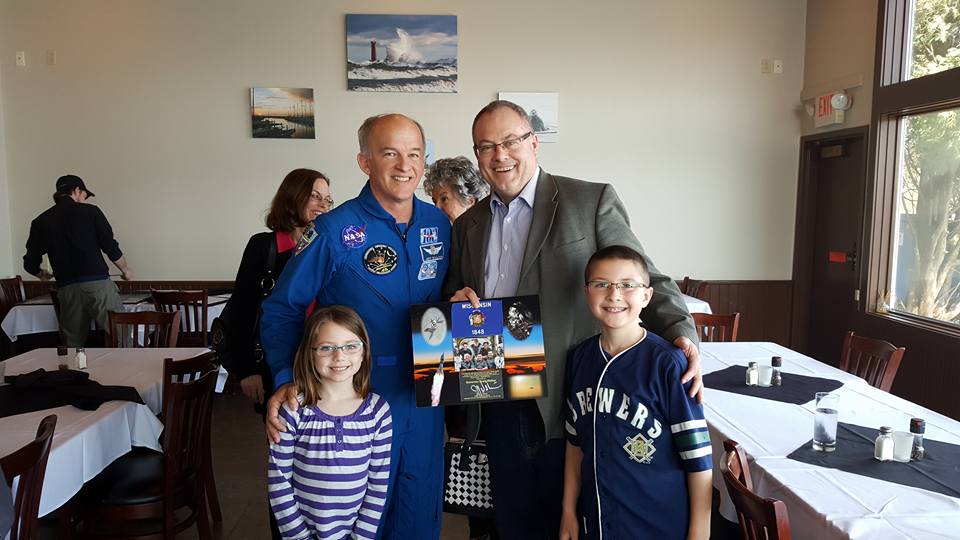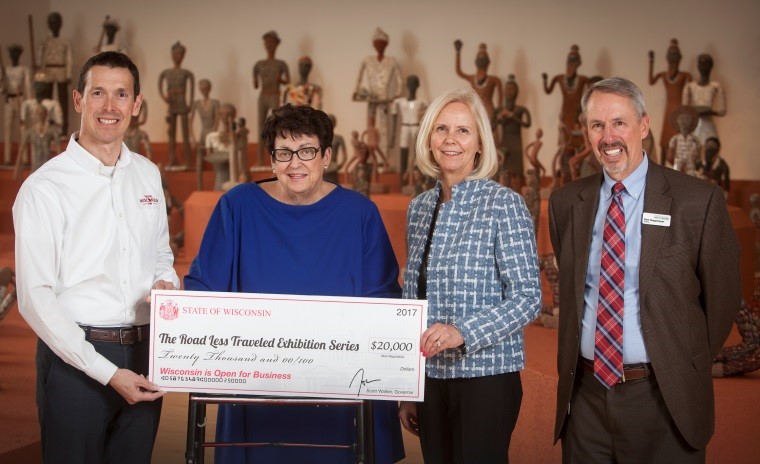|

I recently visited Spaceport Sheboygan and met Space Shuttle astronaut Col. Jeffrey Williams, a native of Winter, WI. On behalf of the State of Wisconsin, I accepted a Wisconsin flag that was flown in outer space! If you've never been to Spaceport Sheboygan, it's definitely worth a visit. Spaceport is a nonprofit science education facility right in downtown Sheboygan that hosts lots of hands-on exhibits and genuine NASA artifacts. It's really impressive!
Today marked the last of the state budget-writing Joint Finance Committee's "road show" public hearings that have occurred across Wisconsin in recent weeks. But it is certainly not too late to share your ideas or concerns about the proposed 2017-19 state budget with me. I appreciate the hundreds of spring survey responses that I have received so far; there is still time to complete my survey online if you didn't receive your paper copy in the mail recently. The legislature will soon begin making final decisions on pieces of the budget bill.
As always, I encourage you to follow my updates on social media or contact my office directly with your questions about the budget or any other subject. Best wishes on your weekend!

The Dignity of Independence from Government
Last week, I briefly mentioned a new bill, Assembly Bill (AB) 238, that I introduced as part of a series of public welfare reforms aimed at helping more people move away from dependence on government assistance toward the dignity of independent living. AB 238 received a public hearing and a committee vote this week and may be headed to the full Assembly for a vote soon.
About 30,000 families in Wisconsin (who typically earn less than 30 percent of the median family income in a given region) receive federal help to afford to rent safe, sanitary homes. The Wisconsin Housing and Economic Development Authority (WHEDA) is the agency that administers the federal funds to about 2,300 of these families who live in counties, including Sheboygan County, where there is no other similar local program/resource. Federal program rules presently provide local and state agencies with no ability to track whether participants are employed or even trying to find jobs.
AB 238, if passed into law, would authorize WHEDA to seek federal permission to try out a pilot program with the 2,300 families whom they serve that would have two components. WHEDA would write criteria that would require able-bodied adults to fulfill some kind of work requirement (i.e., work a minimum number of hours per week, engage in some form of education or skills training, etc.) to continue receiving assistance. But the pilot program would also allow WHEDA to coordinate with the numerous existing state agencies and programs that actively seek to match folks with job search assistance, skills training and other resources. The goal wouldn't be to punish people but to help them pull themselves up and out of poverty. A 2016 federal law greatly expanded opportunities for states and local governments to administer federal aid more flexibly, which means that this might be a perfect time for Wisconsin to try a new approach.
At first, I feared that such a work requirement for low-income families might have negative consequences. The last thing I want to do is kick folks out on the street who are already down on their luck. However, evidence suggests that similar work-requirement programs in a few other states have made significant progress in increasing the employment rate; it has been very rare for participants to actually face any kind of sanctions or have their benefits terminated because they refused to try to work; and, surprisingly, program participants in one study were more likely to agree that the work requirement itself is a fair policy.
I believe that most recipients of public assistance genuinely want to get back on their feet. I think some fear that, perversely, working more will simply reduce the aid they receive and thus waste their efforts; AB 238 is aimed at ensuring that public assistance rewards hard work instead of deterring it.
Way to Go!
 This week, the John Michael Kohler Arts Center in Sheboygan received a $20,000 grant from the Wisconsin Department of Tourism in support of its "The Road Less Traveled" exhibition series. The project marks the Arts Center's 50th anniversary and is expected to attract nearly 100,000 visitors (including nearly 40,000 non-local visitors). These visitors will spend approximately $2.7 million in our local economy. This week, the John Michael Kohler Arts Center in Sheboygan received a $20,000 grant from the Wisconsin Department of Tourism in support of its "The Road Less Traveled" exhibition series. The project marks the Arts Center's 50th anniversary and is expected to attract nearly 100,000 visitors (including nearly 40,000 non-local visitors). These visitors will spend approximately $2.7 million in our local economy.
In 2016, the Department of Tourism awarded about $1.1 million in grants to support 57 projects such as this one across our state. Visitor expenditures in local economies, driven by the marketing from these projects, exceeded $31 million. Grant funds are available to nonprofit organizations for the promotion of Wisconsin tourism events and destinations; in some cases, the state will fund up to 75 percent of a project's first-year advertising and marketing costs, with support in future years that slowly decreases until the project becomes self-sustaining. More information about the grant program, including application materials, are accessible online at http://industry.travelwisconsin.com/.
|

